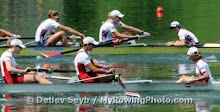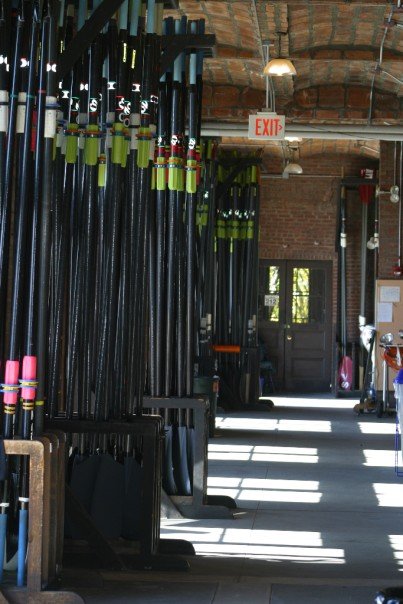We are now roughly halfway through the selection phase of U23 camp, training at the University of Virginia's Rivanna Reservoir Boathouse. I am competing for a spot in the 4x; pending time qualification, this will be the first year the US has sent a women's quad to U23's/the Nations' Cup. We are training with the 8+ camp here, and the entire camp will be moving to Princeton on Tuesday to race at Elite Nationals and then train alongside the Senior team.
We just finished a very challenging week--18 practices (not including three of Dave O'Neill's 45-minute core workouts) without a single morning or afternoon off. At the beginning of the practice marathon, we took a 1' test; one rising sophomore pulled only a few watts off of the best woman on the Senior team. A few practices from the end of the stretch was the camp 2k erg; the majority of rowers at the camp set personal records, including another rising sophomore who pulled an astounding 6:42. All in all, it is a very strong group, and the elite rowers training in Princeton will perhaps have a more difficult job ahead of themselves then they may have thought in retaining their seats this year and in the coming summers.
Some technical notes: erg technique is actually useful for on-the-water training. Some focuses I've been working on include holding my arms higher during the recovery, so that my hands stay at the same level throughout the entire cycle of the stroke. This puts my lats in a better position to be already engaged at the catch, and prevents too much layback or collapsing at the finish. I've also been working on keeping my chin level at the finish, since I've picked up the habit of looking down at the finish. Finally, keeping the hips rotated forward so that almost all of the power in the stroke comes from the leg drive and pushing the footboard away--this enables a steeper power curve and more total power to be put into the drive.
On the water, I've been trying to get more consistent with stroke technique. Some things I can't pick up quickly because I simply haven't taken enough strokes--both in general and at the kind of ratings we'll be racing at. Some things I have been able to realize and am starting to internalize: (1) the simpler the stroke, the better. Eliminating excess motion, whether layback, reach, wobbles in hands and knees, digging a blade or both, or clenching the shoulders, enables a cleaner and more powerful stroke when the rating is 22 and when it's 36. (2) little differences in body position mean big differences in boat set and rhythm and run. Reaching a little further with one hand than the other, rushing a little into the stern, lifting more on the drive than the other rowers--all these slow the boat down both by making one's own stroke less effective and by making the other rowers much less able to take good strokes. (3) it's easy to be conscious of what you're doing wrong and fix it; it's much harder to be able to retain those changes unconsciously when you need to be going fast enough to take them for granted and think about other things, like a race plan. I realized that in the U23 8+ and the Senior 4- last summer, but it is a different ball game for me at least when it comes to sculling.
We have another 30 hours or so off, so I will hopefully be doing lots of things that I don't have the energy to do normally tomorrow--seeing movies, going lazily swimming in a creek, visiting Monticello, and getting a big mental break from camp. I am excited to get lineups set and head up to Princeton for some racing against completely new people--and to see old friends as well, of course! The camp bubble is necessary but it is pretty mentally fatiguing.















1 comment:
Lovvely blog you have here
Post a Comment